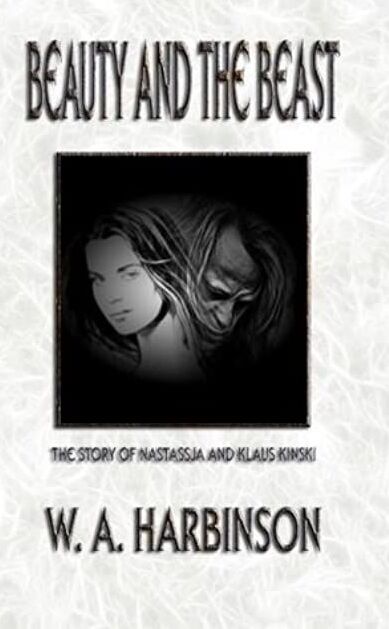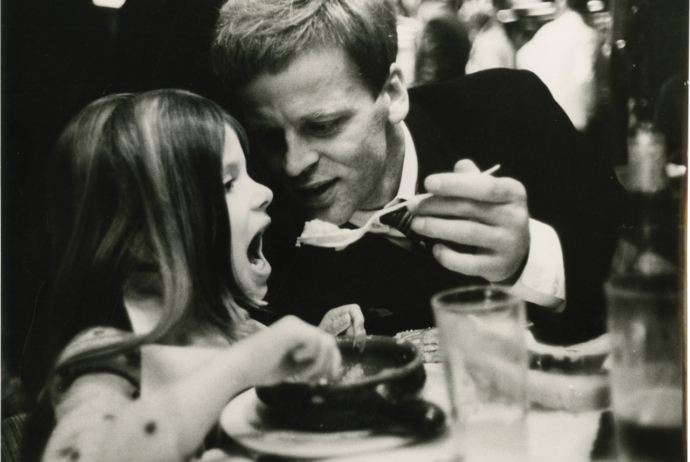Beauty and the Beast: the Story of Nastassja and Klaus Kinski
While there have been a number of written texts about Klaus, there has been little longer than a magazine feature about Nastassja. This book attempts to cover both father and daughter, interweaving their stories and following the paths of their individual careers, as well as their relationship with each other. As such, it deserves attention simply for existing. There can rarely if ever have been such a fascinating parent-child pair in cinema history. And yet… The end result here is more aggravating than informative, and perhaps works best as a reference source for further works, with a host of quotes drawn from various sources, not easily available otherwise.
Part of the problem is, of course, that in both subjects, we are dealing with a pair of highly unreliable narrators. Klaus’s fondness for… well, let’s be charitable and call it literary hyperbole is well known. Put another way, I wouldn’t believe the man if he told me the sky was blue. Yet, it seems the apple may not fall far from the tree. For example, Nastassja has always denied having an affair with Roman Polanski. The facts strongly suggest otherwise. Or take the nature of her relationship with her own father. Even in just the quotes used here, it changes tack almost every time an interviewer brings it up. Harbinson notes the inconsistencies, yet doesn’t attempt to address them, or synthesize them into a coherent conclusion.
On the Klaus front, there’s a rather snotty attitude to almost all his films. While I can’t argue much of it was mercenary work, and had its fair share of stinkers, his notable movies certainly do not start and stop with his Werner Herzog movies. Films like The Great Silence or And God Said to Cain, are worthy of comment and analysis, rather than the casual disregard Harbinson shows to much of Kinski’s work. Worse still, perhaps, labeling the Edgar Wallace adaptations “TV krimes” [sic] and “trashy”. Then there’s calling 1965’s The Dirty Game (a.k.a The Secret Agents) “the first ‘spaghetti’ Western [Klaus] made”. As the film’s title suggests, it’s a spy thriller. But the most amusing faux pas is probably gender reversing Kinski’s co-star in Venom, turning him into “Nicole Williamson”.

That’s mostly flat-out sloppiness, though at least this edition seems to have corrected a previously reported error, stating Quincy Jones died in 2000. Things generally seem a bit better on the Nastassja side, perhaps because of more, easily accessible interviews and other information. Though I’d probably argue with Harbinson about Cat People being a “box-office success.” I’d still have liked to see a deeper analysis of her psychology, though there are a number of quite gorgeous quotes from others. I liked the unnamed producer who said, “I swear, that girl takes the movie camera to bed and makes love to it all night. Then, by day on the film set, the camera returns the compliment and ravishes her.”
I was intrigued by information on some of the roles she didn’t get. In some cases, they went to different people (as in Milos Forman’s Amadeus and Ragtime), but in other cases, the project never materialized at all. For example, “Playing Ingrid Bergman, to whom she had so often been compared, in a CBS-TV miniseries about her remarkable life.” It’s a shame this, or the biopic about Catherine the Great, never came to fruition: I’d like to have seen them. I do concur with the author that Nasti’s career has frequently been one of unfulfilled potential. But I can’t agree with his conclusion that Nastassja was exploited – or, at least, would argue that the exploitation was certainly not a one-way exchange. She may have been seduced by many of those with whom she worked. But they were seduced by her, equally as much. Outside of Roman Polanski (and I’m not going there!), she was a consenting adult, responsible for her own actions and their consequences.
While the copyright date is 2011, the book effectively ends in 1991 with the death of Klaus. Thereafter, we get only a handful of paragraphs, skating quickly over Nastassja’s relationship with Quincy Jones. No mention, for example, of the accusations of sexual abuse leveled at Klaus by Pola in 2013. One benefit of e-publishing is the ability to revise and update works, and the lack of any mention in a biographical work like this feels quite a glaring omission. But it’s definitely not the only such flaw, and while I will likely refer to it again (even if the lack of primary sources listed is less than ideal), it’s not a book I would recommend for anyone beyond the hardcore fan of both father and daughter.
